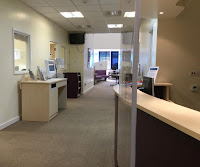In Spring 2015, departments across UCL once again took part
in UCL’s Green Impact, and the Royal Free Medical Library got involved as well.
The library was already one of the few which had reached
platinum status and the Green Team of the library now had the task of
maintaining that status by initiating a project that would promote
sustainability and concern for the environment.
It was decided that we would organise a lecture series and invite
speakers who we knew would provide excellent presentations that would educate
and motivate all those who attended.
The first speaker to visit was John Fleetwood from the
Woodland Trust. He is a highly
inspirational speaker and did not disappoint as he injected humour into his
talk, as well as fascinating personal experiences.
The Woodland Trust is the UK’s largest woodland conservation
charity, and it campaigns to protect ancient woods, restore damaged woods and
inspires people to visit woods and plant trees.
More than half a million trees are planted every year with the help of
300,000 members and supporters.
John stressed the importance of our woodland, especially our
ancient woodland, as so many species, including the endangered, depend upon
it. Some of these creatures include red
squirrels, dormice and bullfinches, not forgetting the ground flora such as
bluebells. John also described how we
are one of the least wooded countries in Europe; with as little as four per
cent of woodland cover.
 |
| Miriam Rice from the
Green Team receiving the Award for Excellence in Sustainability 2015 from
Vice-Provost Professor Anthony Smith |
For the next talk, Dimitra Rappou, Vicky Karidopoulou and
other members of the Waste Prevention Team from the North London Waste Authority
arrived to greet a packed room of staff and students. They were generous with the free gifts, and our
role in preventing food waste was clearly emphasised. The UK produces 15 million tonnes of food
waste every year, and almost half of that is produced by householders. 25 percent of all the food we buy is thrown
away unopened, and the overall waste includes, for example, 236,000 chickens
every day.
All of this is so relevant to our environment as the waste
produces methane, which adds to climate change, but there was plenty we could
do to change our behaviour. We should
never shop when we are hungry, and we should think carefully before taking
advantage of buy one get one free deals.
The team then looked forward to the final talk from
Greenpeace. Athen Ayren from Greenpeace
explained why the organisation is so successful – people did the right thing
when they felt they were being watched.
Athen described her role as a volunteer, and gave many examples of where
Greenpeace had lobbied companies to get them to change.
Both Mattel and Lego had used packaging made from materials
from rainforests and Greenpeace got them to use properly sustainable materials
instead. Similarly, Greenpeace made an
impact against McDonalds in 2006 when the company had been using soya which
came from illegal crops in the rainforests in order to feed its chickens. Man-size chickens invaded branches of the
fast-food chain and McDonalds announced that it would only be using soya from
non-rainforest sources from then on.
The speaker lamented of the attitudes of people towards the
environment, especially when they tried to find any excuse for not accepting
that climate change existed, or asserting that members of Greenpeace were only
in it for themselves. Greenpeace did not
take money from corporations and believed in non-violence.
The North London Waste Authority had left many free gifts
and leaflets, so the Green Team set up a display stand in the library. The stand went on to be a great success, and
the free items were taken away by readers. The message of sustainability and
environmental awareness has reached a lot of our stakeholders, making our
efforts worthwhile, as we are pleased to say that we were presented with the Green
Impact Award for Excellence in Sustainability 2015 at a ceremony in the Wilkins
Building on 15 September.





